Acknowledgement Of Resignation Letter
[Your Name]
[Your Address]
[City, State, ZIP Code]
[Email Address]
[Phone Number]
[Today's Date]
[Recipient's Name]
[Company/Organization Name]
[Address]
[City, State, ZIP Code]
Dear [Recipient's Name],
Subject: Acknowledgement of Resignation
I hope this letter finds you well. I am writing to acknowledge receipt of your resignation letter dated [resignation date], formally informing us of your decision to resign from your position at [Company/Organization Name].
While it is with a mix of emotions that we receive this news, we understand that your decision must have been considered after careful thought and consideration. We want to express our gratitude for the valuable contributions you have made during your tenure with [Company/Organization Name]. Your dedication and hard work have been instrumental in the success of [Company/Organization Name], and you will be missed by your colleagues and the entire team.
We understand that the effective date of your resignation is [last working day], and we will ensure that all necessary arrangements are made for a smooth transition during this period. If there are any specific tasks or responsibilities you believe require special attention during the handover process, please do not hesitate to let us know, and we will do our best to accommodate your request.
As a departing employee, you will be entitled to any accrued benefits and compensation up to your last working day. Our HR department will be in touch with you to guide you through the exit process and provide further information regarding your final paycheck, benefits, return of company property, and any other relevant details.
On behalf of the entire team at [Company/Organization Name], I want to extend our best wishes for your future endeavors. We have no doubt that you will continue to achieve great success in your future pursuits.
Please do not hesitate to reach out if you have any questions or need assistance during this transition period. Our doors will always be open to welcome you back should you ever decide to return.
Thank you once again for your dedication and contributions to [Company/Organization Name]. We wish you all the best for your future endeavors.
Sincerely,
[Your Name]
[Your Job Title]
[Company/Organization Name]
[Email Address]
[Phone Number]
Standard Professional Acknowledgment
Subject: Acknowledgment of Your Resignation
Dear [Employee Name],
This email serves to formally acknowledge receipt of your resignation letter dated [date]. We have accepted your resignation from your position as [job title], effective [last working date].
We appreciate the [time period] of service you have provided to [Company Name]. During your tenure, you have contributed significantly to [specific achievements/projects]. Your dedication and professionalism have been valued by the entire team.
Please coordinate with [HR representative/supervisor name] regarding the transition of your responsibilities and the return of company property. We will ensure that your final paycheck, including any accrued vacation time, will be processed according to company policy.
We wish you success in your future endeavors.
Best regards,
[Manager Name]
[Title]
[Company Name]
Warm and Appreciative Acknowledgment
Subject: Thank You and Best Wishes
Dear [Employee Name],
I received your resignation letter with mixed emotions - while I'm sad to see you go, I'm excited about the new opportunities ahead of you.
Your [time period] with us has been remarkable. You've not only excelled in your role as [position] but have also been a mentor, friend, and inspiration to many of us here. The [specific projects/contributions] you've led will continue to benefit our organization for years to come.
I want you to know that your decision is completely understood and supported. Growth and new challenges are essential, and I'm confident you'll excel in your next chapter.
Please let me know how I can assist during your transition period. Whether it's providing references, helping train your replacement, or simply ensuring your departure is as smooth as possible, I'm here to help.
Thank you for everything you've brought to our team. You'll be greatly missed, but I hope we can stay in touch.
Warmest regards,
[Manager Name]
Disappointed but Professional Acknowledgment
Subject: Acknowledgment of Resignation - [Employee Name]
Dear [Employee Name],
I acknowledge receipt of your resignation letter dated [date]. While I accept your decision to resign from your position as [job title] effective [date], I must express our disappointment in losing such a valuable team member.
Given your excellent performance and the significant projects currently underway, we had hoped you would continue your career growth within our organization. However, we respect your decision and wish to ensure a professional transition.
Please schedule a meeting with HR within the next few days to discuss handover procedures, outstanding projects, and administrative matters. We expect all company property to be returned and confidential information to remain protected as per your employment agreement.
Your final compensation will be calculated and processed according to company policy.
We wish you well in your future pursuits.
Sincerely,
[Manager Name]
[Title]
Counter-Offer Acknowledgment
Subject: Your Resignation - Let's Discuss
Dear [Employee Name],
Thank you for your resignation letter. Before we process this formally, I'd like to schedule a meeting to discuss your decision and explore whether there are ways we can address your concerns.
Your contributions as [position] have been exceptional, particularly your work on [specific projects]. The team and I believe there may be opportunities to better align your role with your career goals and expectations.
Could we meet this week to discuss potential adjustments to your position, compensation, responsibilities, or work arrangements? I'm confident we can find a solution that benefits both you and the organization.
Please let me know your availability for a confidential discussion.
If, after our conversation, you still wish to proceed with your resignation, we will of course respect that decision and ensure a smooth transition.
Looking forward to hearing from you.
Best regards,
[Manager Name]
Immediate Resignation Acknowledgment
Subject: URGENT - Acknowledgment of Immediate Resignation
Dear [Employee Name],
This message confirms receipt of your immediate resignation from [position] as of today, [date]. While we typically require [notice period] notice, we understand that circumstances sometimes necessitate immediate departure.
Given the urgent nature of your resignation, please report to HR today at [time] to complete exit procedures, return company property, and discuss the transfer of your current responsibilities to other team members.
Your final paycheck will be processed and available by [date]. Any outstanding matters will be handled as quickly as possible.
We wish you well despite the abrupt circumstances of your departure.
Regards,
[Manager Name]
[HR Representative Name]
Long-Term Employee Acknowledgment
Subject: Celebrating Your Journey - Resignation Acknowledgment
Dear [Employee Name],
Your resignation letter marking the end of your [number] years with [Company Name] has touched all of us deeply. What an incredible journey it has been!
From [early role/achievement] to your current position as [title], you have been instrumental in shaping our organization. You've witnessed and contributed to [company milestones/changes], mentored countless colleagues, and left an indelible mark on our company culture.
While we're saddened by your departure, we celebrate this new chapter in your life. Your legacy here includes [specific achievements/impacts], and your influence will continue long after your last day on [date].
We're planning a celebration in your honor on [date] and hope you'll allow us to properly thank you for your years of dedicated service. Details will follow separately.
Please know that you will always be part of the [Company Name] family. We hope you'll stay in touch and visit us often.
With deepest appreciation and best wishes,
[Senior Management/CEO Name]
On behalf of the entire [Company Name] team
Performance-Related Resignation Acknowledgment
Subject: Acknowledgment of Resignation
Dear [Employee Name],
We acknowledge receipt of your resignation from the position of [job title] effective [date].
Given the recent performance discussions and improvement plan we implemented, we understand this decision may be in the best interest of both parties. We appreciate that you've chosen to resign rather than continue through the performance improvement process.
Please coordinate with [HR representative] to ensure all company materials are returned and final administrative matters are completed. Your final compensation will be processed according to standard policy.
We wish you success in finding a role that better aligns with your skills and career objectives.
Professionally,
[Manager Name]
[HR Representative Name]
Casual Startup Environment Acknowledgment
Subject: Thanks for the ride! 🚀
Hey [Employee Name],
Got your resignation message - wow, what a journey it's been since you joined us at [startup name]!
I remember when you were employee number [number] and we were all working out of [location]. You've been through [major milestones] with us, and honestly, the company wouldn't be where it is today without your hustle and creativity.
I totally get why you're moving on - [reason if appropriate] sounds like an amazing opportunity, and you deserve every bit of success coming your way.
Let's grab coffee this week to talk about the handover and make sure we're not leaving any loose ends. Also, seriously, don't be a stranger. You've got family here, and we want to hear about all your future adventures.
Keep being awesome!
[Founder/Manager Name]
P.S. - The team wants to throw you a proper send-off. Pizza and beers on us this Friday?
What is an Acknowledgment of Resignation Letter and Why is it Important
An acknowledgment of resignation letter is a formal document sent by an employer to confirm receipt and acceptance of an employee's resignation. This letter serves multiple critical purposes: it provides legal documentation of the employment termination, establishes the final working date, outlines next steps in the transition process, and maintains professional relationships. The letter protects both employer and employee by creating a clear record of the resignation terms, prevents misunderstandings about final responsibilities, and demonstrates professionalism that can preserve future networking opportunities.
Who Should Send an Acknowledgment of Resignation Letter
The acknowledgment should typically come from the employee's direct supervisor, HR representative, or senior management depending on company hierarchy and policies. In smaller organizations, the owner or CEO might send the acknowledgment directly. For mid-level managers, their department head usually handles the acknowledgment. HR departments often co-sign or send the acknowledgment to ensure proper documentation and policy compliance. In some cases, both the immediate supervisor and HR may send separate acknowledgments - one focusing on the personal/professional relationship and another covering administrative details.
When to Send an Acknowledgment of Resignation Letter
Acknowledgment letters should be sent within 24-48 hours of receiving the resignation to demonstrate prompt and professional response. Immediate acknowledgments are necessary when the employee requests immediate departure or cites emergency circumstances. The timing may vary based on company policy, but delays beyond a week can appear unprofessional or create legal complications. Send acknowledgments during business hours via the same method the resignation was received (email for email resignations, formal letter for written resignations). If the resignation was verbal, follow up immediately with written acknowledgment to create proper documentation.
How to Write and Send an Acknowledgment of Resignation Letter
Begin by reviewing company policies and legal requirements for resignation acknowledgments. Draft the letter using appropriate tone based on the circumstances and relationship with the employee. Include essential elements such as acknowledgment of receipt, acceptance of resignation, final work date, and next steps. Personalize the message when appropriate, but maintain professionalism throughout. Coordinate with HR to ensure compliance with company policies and legal requirements. Send the acknowledgment via the same communication method used by the employee for their resignation. Keep copies for employee files and company records.
Common Mistakes to Avoid When Writing Acknowledgment Letters
Avoid emotional reactions or negative comments about the employee's decision, even if you're disappointed. Don't delay sending the acknowledgment, as this can create confusion about acceptance of the resignation. Never attempt to guilt-trip the employee or make their departure more difficult than necessary. Avoid discussing confidential company information or speaking negatively about the employee's future plans. Don't forget to coordinate with HR before sending to ensure policy compliance. Avoid making promises about references or future employment without proper authorization. Never send acknowledgments when angry - wait until you can respond professionally.
Requirements and Prerequisites Before Sending Acknowledgment
Review the employee's contract and company policies regarding resignation procedures and notice periods. Check for any non-compete agreements, confidentiality clauses, or other contractual obligations that need attention. Coordinate with HR to understand legal requirements and company procedures for processing resignations. Gather information about the employee's current projects, responsibilities, and any ongoing commitments. Determine who will handle the transition of duties and whether a replacement needs to be hired. Verify the proposed last working date against company requirements and business needs. Ensure you have authority to accept the resignation or need approval from higher management.
Essential Elements and Structure of Acknowledgment Letters
Every acknowledgment should include clear confirmation of resignation receipt with specific date references. State acceptance of the resignation and confirm the final working date. Outline immediate next steps including transition planning, project handovers, and administrative requirements. Include information about final compensation, benefits continuation, and return of company property. Maintain professional tone while expressing appropriate sentiment based on the relationship and circumstances. Close with well-wishes for the employee's future and contact information for questions. For email acknowledgments, use clear subject lines that reference the resignation. Always include your title and contact information for any follow-up questions.
Formatting Guidelines and Best Practices
Keep acknowledgment letters concise but comprehensive, typically one page or 3-4 paragraphs for most situations. Use professional business letter format for formal acknowledgments or clear email format for digital communications. Choose tone based on relationship with employee and circumstances - formal for professional settings, warmer for long-term employees or close working relationships. Send via the same medium as the resignation was received (email to email, letter to letter). Use company letterhead for formal acknowledgments and include proper signatures. Ensure clarity in all dates, particularly the last working day, to prevent confusion. Copy HR representative when appropriate and maintain consistent formatting with company standards.
Follow-up Actions After Sending Acknowledgment
Schedule transition meetings to discuss project handovers and knowledge transfer. Coordinate with HR for exit interviews, final paperwork, and benefits information. Begin succession planning and determine if replacement hiring is necessary. Ensure return of all company property including equipment, keys, access cards, and confidential materials. Process final payroll including any accrued vacation time or benefits. Update team members and stakeholders about the departure and transition plans. Prepare reference letters if requested and appropriate. Monitor the transition period to ensure smooth handover of responsibilities. Document any issues or outstanding matters for legal protection.
Advantages and Disadvantages of Formal Acknowledgment Letters
Formal acknowledgment letters provide legal protection by documenting the resignation terms and acceptance. They demonstrate professionalism and can preserve positive relationships for future networking or rehiring opportunities. Clear acknowledgments prevent misunderstandings about final work dates, compensation, and responsibilities. However, formal letters can sometimes feel impersonal, especially for valued long-term employees. Overly formal responses might damage relationships if the tone doesn't match the working relationship. Time invested in crafting acknowledgments could be spent on immediate business needs. Some employees might interpret formal acknowledgments as dismissive rather than professional, particularly in casual work environments.
Comparing Acknowledgment Letters with Alternative Responses
Acknowledgment letters differ from counter-offers by accepting rather than challenging the resignation decision. Unlike immediate acceptance conversations, written acknowledgments provide documented proof of resignation terms. Formal letters offer more legal protection than verbal acknowledgments but may feel less personal than face-to-face conversations. Email acknowledgments are faster than written letters but may be perceived as less formal. Some companies use standardized templates while others prefer personalized responses based on the employee relationship. Alternative approaches include phone calls followed by written confirmation, in-person meetings with documented outcomes, or team announcements with individual acknowledgments.
Professional Tips and Best Practices for Acknowledgment Letters
Always respond promptly to demonstrate professionalism and respect for the employee's decision. Tailor the tone and content to match your relationship with the employee and the circumstances of their departure. Keep copies of all resignation-related correspondence for legal and HR purposes. Consider the employee's future reference needs when crafting your response. Use acknowledgments as opportunities to strengthen professional relationships rather than simply fulfilling administrative requirements. When appropriate, express genuine appreciation for the employee's contributions. If disappointed by the departure, focus on professional transition rather than personal feelings. Always coordinate with legal and HR teams for high-level employees or sensitive situations.

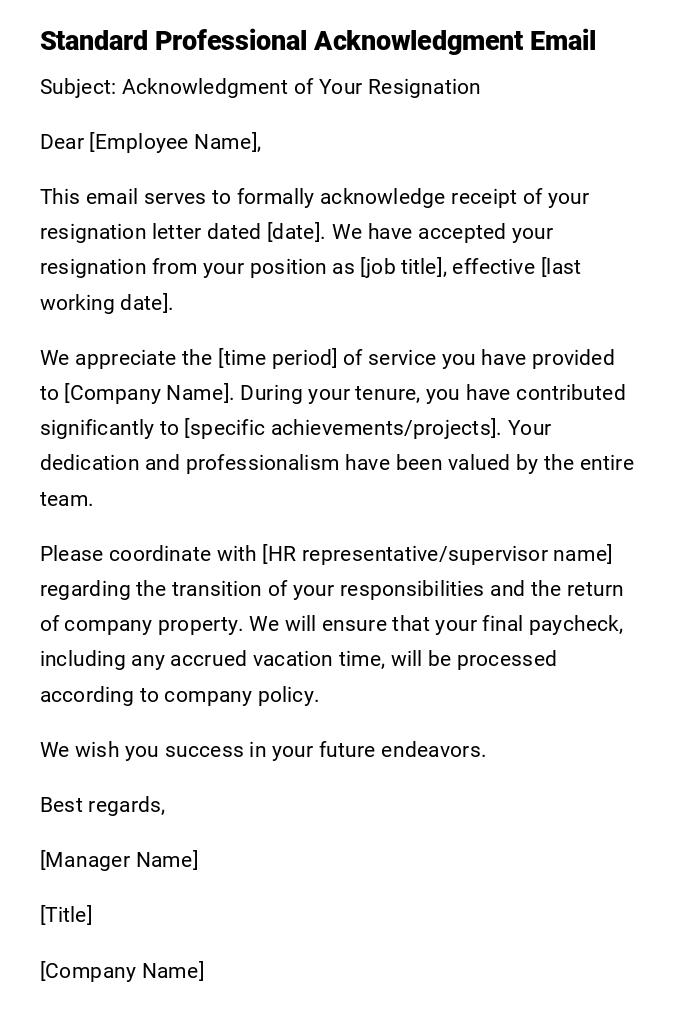
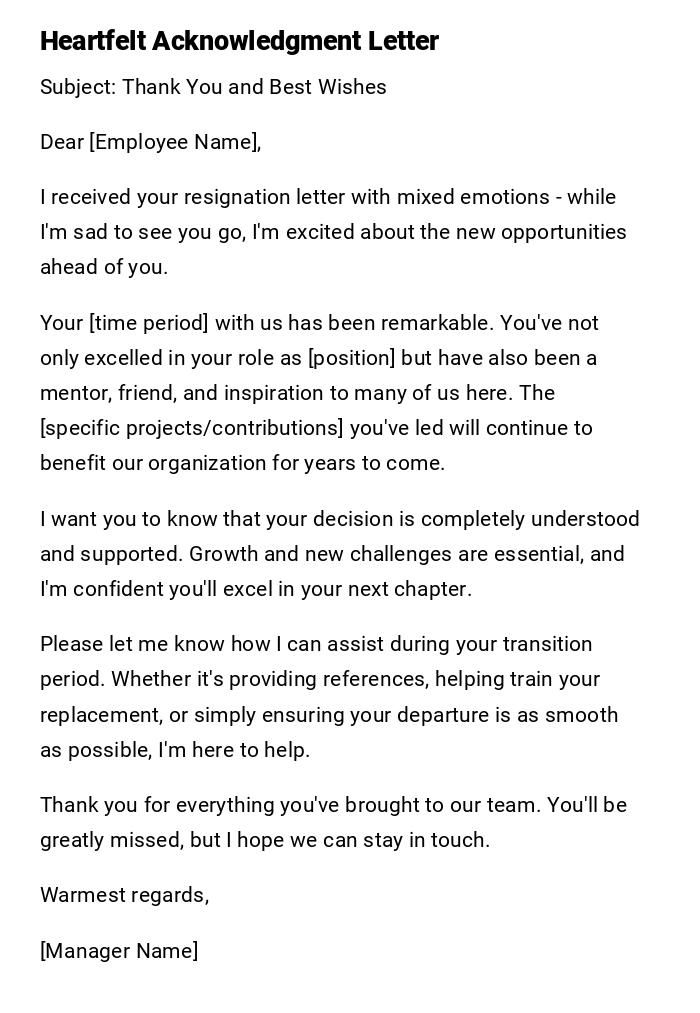
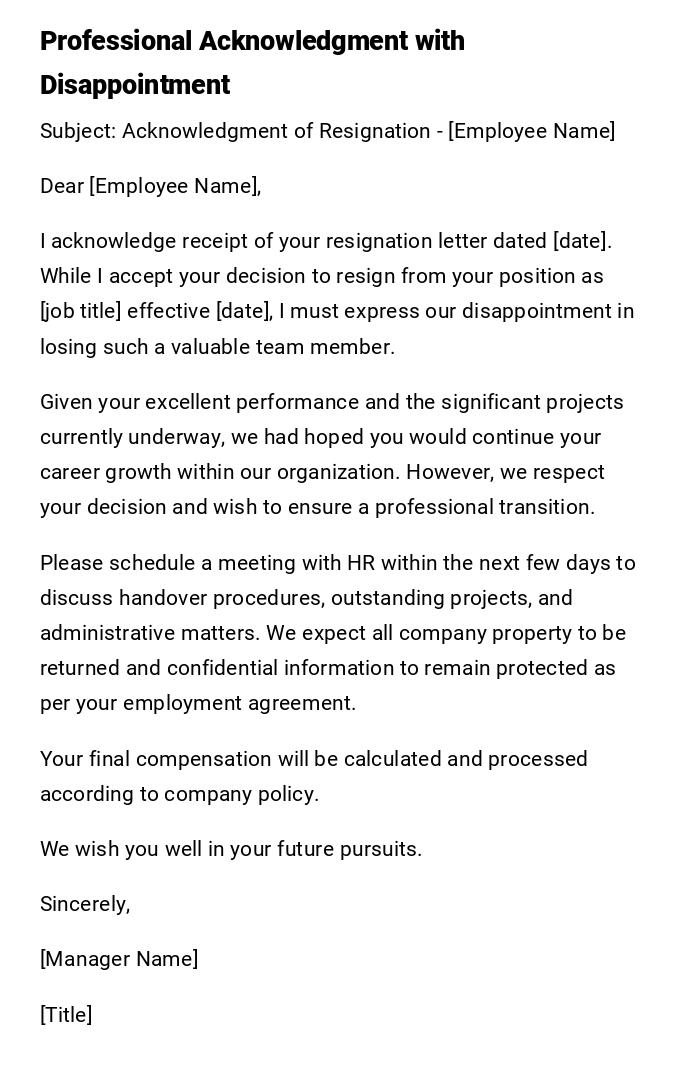
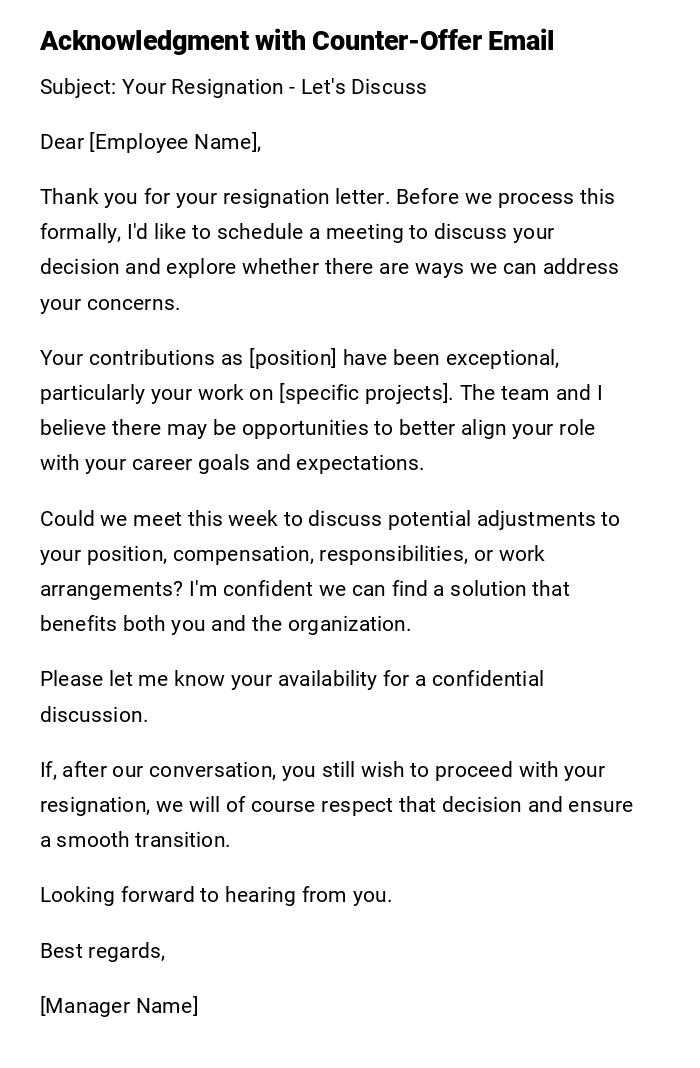
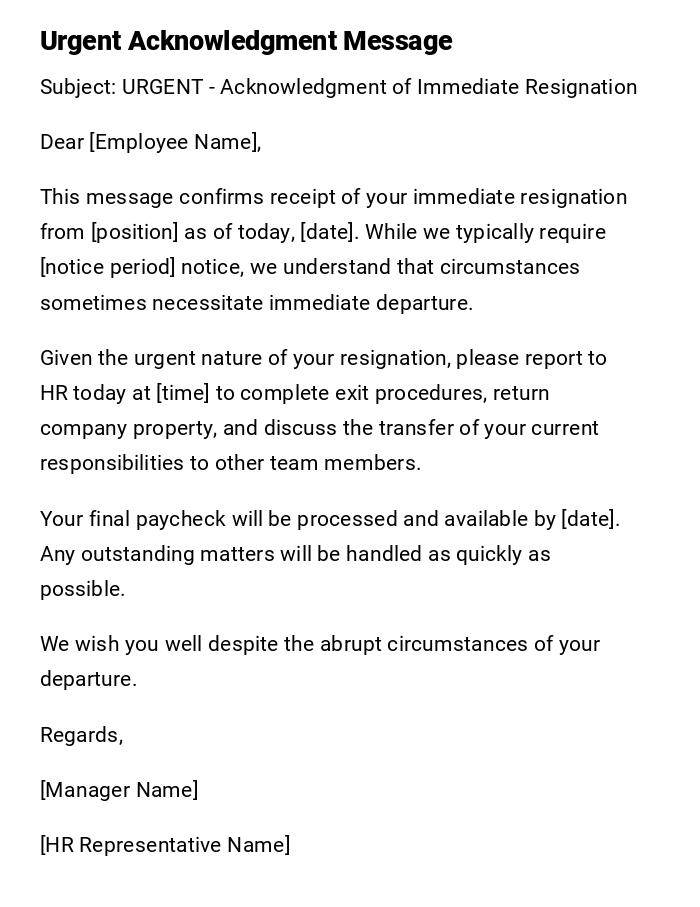
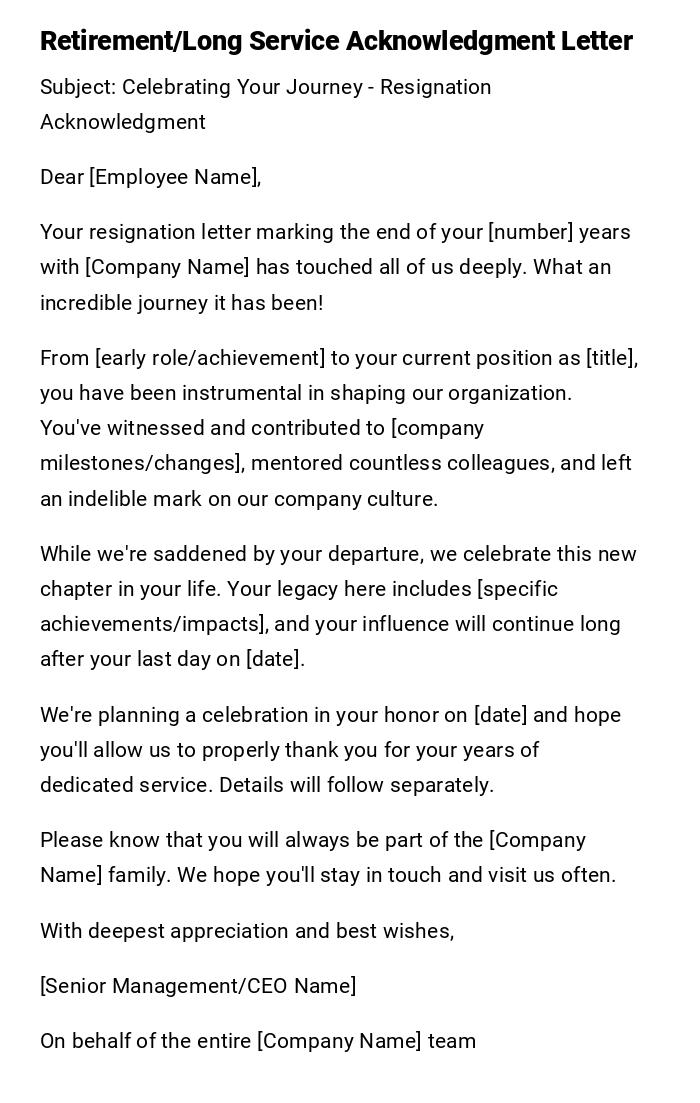
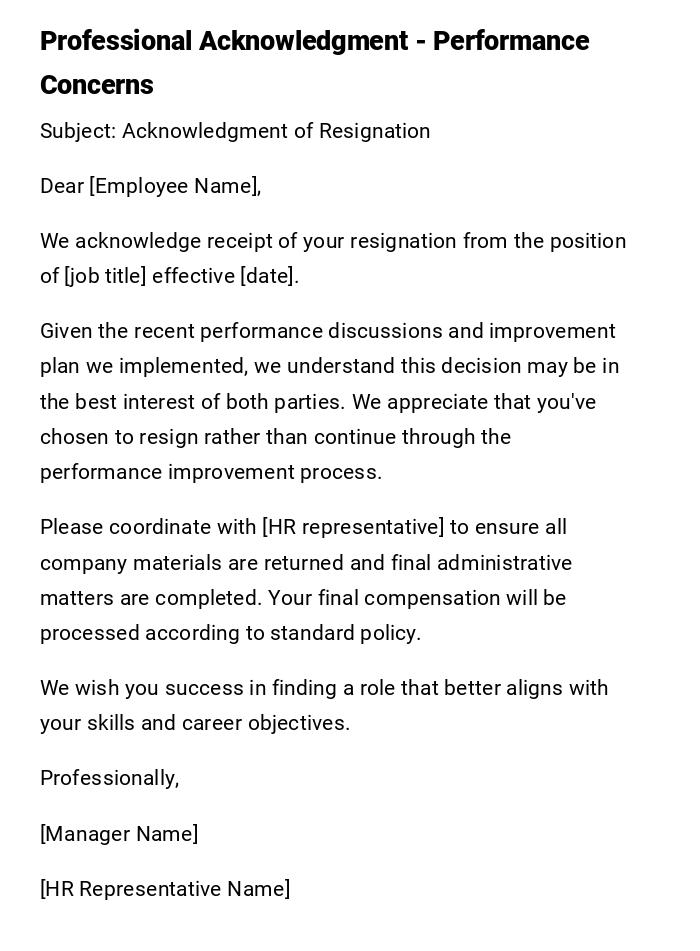
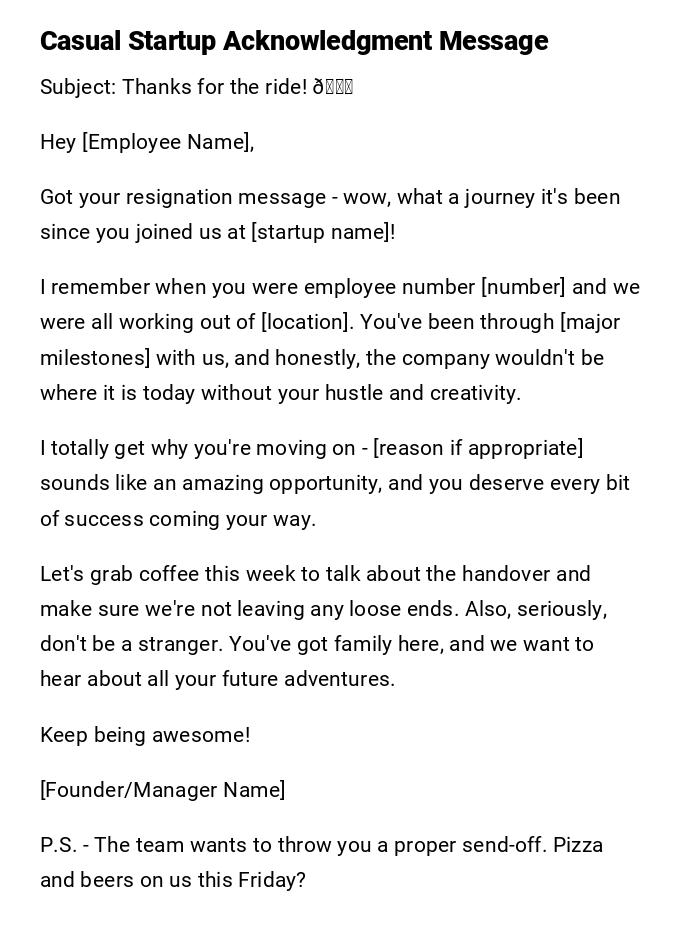

 Download Word Doc
Download Word Doc
 Download PDF
Download PDF